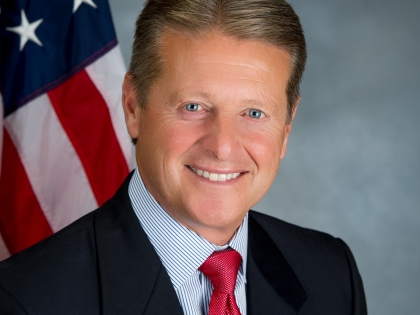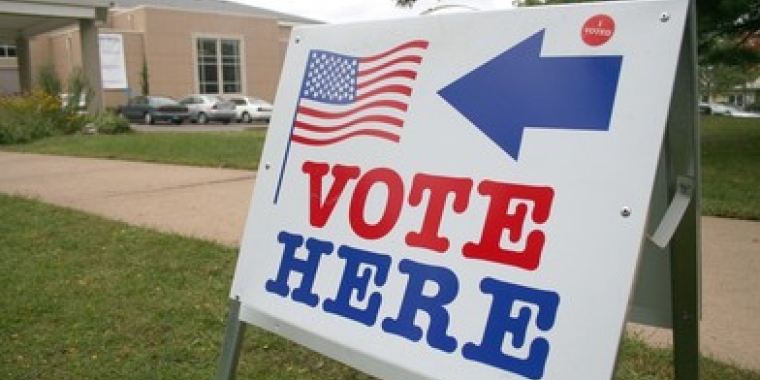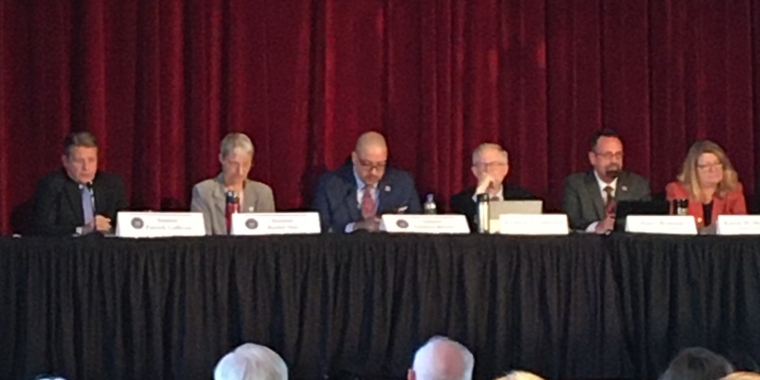
Senate Passes 2017-18 Budget Resolution to Control Spending and Protect Taxpayers
Jim Ranney
March 20, 2017
-
ISSUE:
- Budget Resolution

Senator Patrick M. Gallivan (R-C-I, Elma) says the New York State Senate has passed a 2017-18 budget plan that creates more economic opportunity through targeted investments in infrastructure, tax reductions, and continued fiscal discipline. The Senate proposal continues a record of restrained state spending without new taxes and makes sensible and important changes to a number of the Governor’s proposals that should serve as a blueprint to a final, on-time budget.
“The Senate’s budget controls the size and cost of government while at the same time helping hardworking, middle class families and businesses,” Gallivan said. “The spending plan supports economic development, provides much needed tax relief, invests in education, promotes agriculture and provides more funding for roads and bridges. It also keeps the Western New York Children’s Psychiatric Center in West Seneca.”
REDUCING PROPERTY TAXES
The Senate’s budget proposal advances several measures to protect the significant savings provided by the School Tax Relief program and would help small businesses save on their property taxes. The measures include:
· Making small businesses with less than $350,000 in net business income and less than 20 employees eligible to receive the STAR benefit on their primary business property, saving $370 million when fully phased in;
· Rejecting the Executive Budget proposal to cap the growth of the STAR benefit, saving taxpayers an estimated $272 million over the next three years alone;
· Reversing changes made last year to the STAR Personal Income Tax Credit Program from reimbursements back to an up-front exemption effective for the 2018–19 school year;
· Addressing the significant delays of STAR payments by the state to taxpayers that occurred this year by requiring the state to postmark all advance payment STAR checks by September 15th, requiring the state to pay interest if they are mailed late, and reimbursing taxpayers for penalties or interest due to late school tax bill payments; and
· Making permanent the state’s property tax cap.
PROMOTING ECONOMIC DEVELOPMENT
The Senate budget rejects a number of onerous tax-and-fee increases proposed by Governor Cuomo, including new DMV fees, new taxes on internet purchases and a new surcharge on pre-paid cell phones. In addition, to help avoid future tax increases, the Senate’s resolution imposes a statutory cap on state spending.
The Senate requires more transparency in the operations of Regional Economic Development Councils to further ensure accountability and prevent conflicts of interest in the awarding of billions of dollars in statewide economic development funds. The resolution rejects the rebranding of START-Up NY and closes the door to new applicants as of April 1, 2018, followed by an assessment to measure the program’s effectiveness.
Tax Relief for Businesses
In addition to creating the STAR benefit for small businesses, the Senate proposal would:
· Expand the existing Personal Income Tax exemption for small businesses and small farms and reduce the Corporate Franchise Tax business income tax rate from 6.5 percent to 2.5 percent over a two-year period, saving a total of $466 million;
· Increase the Manufacturer’s Real Property Tax Credit from 20 percent to 50 percent of any annual property taxes paid during the year for property owned or leased by the manufacturer and used during for manufacturing, saving businesses $150 million; and
· Increase the MTA Payroll Tax exemption for sole proprietors from $50,000 to $250,000.
Reforms to Workers’ Compensation
The Senate has advanced a number of sensible workers’ compensation reforms, such as updates to duration caps and schedule loss of use awards. To improve the overall system, changes would be put into place to reduce frictional costs, streamline forms, improve independent medical examinations and require implementation of a prescription drug formulary by December 31, 2017.
Expanding Ride-sharing
The resolution provides ride-sharing companies with the ability to expand operations outside of New York City and enable new jobs to be created by offering more safe, reliable transportation options to communities and visitors upstate and on Long Island.
Promoting Workforce Development
The Senate’s Task Force on Workforce Development is continuing to improve employee readiness; better meet the workforce needs of private sector employers; connect job seekers with potential employers; retrain those who have lost jobs; and help make New York State’s overall economy more robust, dynamic and resilient. This budget helps implement those goals by including:
· $4 million for the Workforce Development Institute (WDI);
· $3 million for the WDI Manufacturing Initiative;
· $980,000 for the Chamber On-the-Job Training Program;
· $600,000 for Statewide Youth Build programs; and
· Increasing the current salary cap for BOCES to attract and retain qualified and skilled teachers for career and tech programs.
KEEPING WNYCPC IN WEST SENECA
The Senate plan includes language advanced by Senator Gallivan requiring Western New York Children’s Psychiatric Center be maintained in Erie County as a separate and distinct entity, both organizationally and physically. It also requires that $14 million be used to rehabilitate the existing West Seneca facility.
SUPPORTING LOCAL INFRASTRUCTURE
Historic State Investment of Nearly $8 Billion in Clean Water
The Senate makes a historic investment of nearly $8 billion to ensure all New Yorkers have access to clean, safe drinking water by addressing extensive water quality issues and infrastructure needs. The measures include:
· Creation of a new $5 billion Clean Water Bond Act;
· Support for the proposed $2 billion for clean water infrastructure;
· Establishment of a new Drinking Water Quality Institute;
· Creation of the Emerging Contamination Monitoring Act;
· $300 million for the Environmental Protection Fund (EPF);
· $175 million in continued funding for the Water Quality Infrastructure Investment Program; and
· $275 million in continued funding for Clean Water and Drinking Water State Revolving Funds.
Increased Support for Local Roads and Bridges
The budget proposal continues the Senate’s commitment to parity with the DOT and MTA capital plans, and ensures long-term regional balance in how transportation projects are funded. It helps local governments make necessary infrastructure improvements and create jobs by adding:
· $91 million in non-MTA capital, for a total $175.5 million;
· $75 million for the Consolidated Local Street and Highway Program (CHIPS), for a total $513 million;
· $50 million for the Local BRIDGE NY program, for a total $150 million;
· $11.5 million to increase the reimbursement rate to cities for maintaining State highways;
· $11.3 million in non-MTA downstate and upstate transit systems, and $5 million – including a $4 million Executive Budget restoration - for rural transportation systems; and
· $27.5 million for the Aviation Capital Grant Program, for a total $40 million, and $2 million to provide the full state match to federal funds for aviation, totaling $6 million.
IMPROVING HIGHER EDUCATION ACCESS AND AFFORDABILITY
Enhanced Tuition Assistance Program (E-TAP):
The Senate improves upon the higher education proposals in the Executive Budget by making more middle-class families eligible for more financial aid, and giving students greater flexibility in school choice to promotes success.
The Senate invests $109 million in a new E-TAP initiative that helps students in public and independent schools by increasing the minimum TAP award from $500 to $3,000 and the maximum to $5,500. Income thresholds would also be increased to $100,000 in 2017-18; $110,000 in 2018-19; and $125,000 in 2019-20. To be eligible for E-TAP, students would need a 3.0 GPA by the start of their junior year and take 30 credits over each academic year – which is a more flexible option for students unable to take a 15-credit semester as required in the Executive Budget proposal. The Senate budget proposal also includes:
· $10 million to expand TAP to include part-time community college students; and
· $2 million in new funding for Graduate TAP, to help students who are in combined undergraduate/graduate degree programs.
College Affordability:
The Senate budget establishes a new Task Force on College Affordability; requires private colleges to develop college affordability plans with the goal of lowering costs; and creates the New York State Tax Advantage Student Loan Repayment Program. This innovative measure acts like a 401k for student debt – enabling employees to put up to $2,500 pre-tax each year into an account specifically set up by an employer to help pay student loan debt. The employer would then match the employee’s contribution and receive a tax deduction. The Senate also:
· expands the STEM scholarship to include private institutions;
· increases the tuition tax credit to a maximum of $2,500 and the deduction to a maximum of $50,000 of allowable college tuition expenses, over 10 years;
· provides $2 million in funding to support child care on SUNY and CUNY campuses to give access to students in need of care while pursuing a degree; and
· provides a maintenance of effort provision that requires the state to fund SUNY and CUNY at no less than the prior year's funding level.
MAKING NEW YORK MORE AFFORDABLE
Supporting Fair Wages for Direct Care Professionals
The Senate provides $45 million annually to compensate direct care professionals for the important work they do to support individuals with disabilities. It addresses a lack of funding in the Executive Budget to help appropriately adjust salaries at not-for-profits that employ workers who provide state services for individuals with autism, serious brain injury, cerebral palsy, Down syndrome, and other developmental disabilities.
Expanding the Child Care Tax Credit:
The Senate provides an additional $95 million on top of the Executive budget’s child care proposals to help more low- and middle-income families qualify for the state’s child care tax credits. Families making less than $50,000 would have their credits increase by 50 percent over existing amounts. In addition, the current cap on child care expenses would rise from $6,000 to a maximum of $9,000 (depending on the number of children) for families with up to five children.
Increasing the Safety and Availability of Child Care
To help working parents find affordable child care, and give them peace of mind about their child’s safety, the Senate included several budget provisions to:
· Increase child care subsidy funding from traditional sources to maintain the current level of $806 million;
· Add $5.3 million to restore child care facilitated enrollment programs that help increase access to child care financial assistance, especially for moderate income families, in Monroe, Erie, Onondaga and Oneida counties, the Capital District, and New York City;
· Require the Office of Children and Family Services (OCFS) to conduct a comprehensive study of the availability of child care for low income working parents in the State; and
· Enhance the safety of child day care programs by giving OCFS greater ability to suspend or limit a license or registration to operate when public health or safety is at risk and to assess fines for violations. This legislation also creates a comprehensive online registry of child care providers in the State that will include inspection and violation history for each.
Savings on Retirement Income:
To help more seniors save money and choose to stay in New York during retirement, the Senate increases the private pension and retirement income exclusion from $20,000 to $40,000 for single taxpayers and to $80,000 for married taxpayers, over three years. This would be the first increase to the exempt amount of private pensions and retirement since 1981 and save retirees approximately $315 million.
SUPPORTING LEARNING OPPORTUNITIES FOR ALL CHILDREN
Significant Education Funding Increases
The Senate’s education budget includes a five percent increase in school aid funding over last year, for a total of $1.2 billion, bringing the total investment in schools to a record level of $25.4 billion. Other highlights include:
· Doubling the Governor’s Foundation Aid proposal with $478 million in additional funding, for a total increase of more than $906 million since 2016-17;
· Rejecting the Executive Budget’s changes to the Foundation Aid formula and instead provides flexible operating aid to districts for operating expenses which may include creation or expansion of dual language programs, after school programs, mental health services, and personnel within schools;
· Removing a cap on charter schools and placing surrendered charters back into the pool of eligible charters;
· Increasing facilities funding for New York City charter schools;
· Providing statewide building aid for charters;
· Including significant funding increases over the Executive Budget for non-public schools: an additional $34 million for reimbursable security costs; $15 million for non-public school safety grants; increasing by $7 million above the Executive Budget proposal for mandated services aid; $25 million for non-public school STEM programs; $3 million to expand eligibility for STEM college scholarships to students at non-public schools; and $7.7 million for non-public school immunization compliance.
PROTECTING PUBLIC HEALTH
Investments in Battling Substance Abuse
The Senate’s budget proposal includes $206 million for the state’s heroin and opioid-related initiatives. This is an increase of $32 million over last year’s enacted budget, and above the approximately $200 million announced in the Executive Budget.
The Senate would also expand upon an initiative first proposed as a recommendation by the Senate’s Joint Task Force on Heroin and Opioid Addiction to help teens battling substance abuse. The measure increases the proposed number of Recovery High Schools from two to three – enabling more youth to find a secure learning environment to help them on their way to overcoming addiction.
Transforming Health Care Delivery Statewide
The Senate includes $300 million above the Executive Budget's proposal for a total of $800 million for the Health Care Facility Transformation Program. The funding is included subject to additional details to be further outlined in the budget process to ensure appropriate regional disbursement, and appropriate disbursement among community based providers and all facilities. Further, before making the allocation, the remaining capital from last year’s budget of $195 million should be awarded.
PROMOTING AGRICULTURE
Restoring $12 Million in Agriculture Support
The Senate commits significant resources to promoting and supporting agriculture in the state, including $12 million in restorations to over 30 programs throughout the state that were cut in the Executive Budget. In addition, the budget resolution:
· Makes the Investment Tax Credit refundable for farmers.
· Enacts the Farm-to-Food-Bank proposal that allows farmers to claim a tax credit to for produce and other farm product donations to food banks or other emergency food programs.
· Modifies the executive proposal for state fair funding to include $10 million for local fair capital costs;
· Adds $5 million for a competitive grant program for animal shelters; and
· Doubles the Farm Workforce Retention Credit upstate and further increase the credit for farms that are located in Nassau, Suffolk, or Westchester counties due to the accelerated minimum wage schedule in those counties.
SUPPORTING VETERANS
The Senate budget includes a number of measures to provide valuable assistance and support to New York’s veterans, including:
· $3.2 million for the Joseph P. Dwyer Veteran Peer to Peer Program;
· $1 million to implement a veterans treatment court peer-to-peer service grant program;
· $700,000 for the New York State Defenders' Association Veterans’ Defense Program;
· $400,000 for the NLP Research and Recognition Project for PTSD research treatments;
· $350,000 for Legal Services of the Hudson Valley’s Veterans and Military Families Advocacy project;
· $100,000 to expand Legal Services of the Hudson Valley’s Veterans and Military Families Advocacy project into Westchester County;
· $250,000 for Nassau Suffolk Law Services Committee’s Veterans’ Rights Project;
· $250,000 in additional funding for the Veterans Outreach Center in Monroe County; and
· $300,000 for Warrior Salute.
PROTECTING SENIORS
The Senate restores cuts and adds additional resources to help seniors continue to receive long-term services and supports, such as home care, transportation and meals, and initiatives to prevent elder abuse. Measures include:
· Adding $5 million for the Community Services for the Elderly Program (CSE) for transportation, case management and other supports;
· Restoring $3.35 million in the Executive Budget for the New York Connects program that provides free comprehensive services and supports for seniors and caregivers;
· Providing $10 million to establish a statewide central register of elder abuse and maltreatment;
· Restoring $700,000 for the establishment of multidisciplinary investigative teams for reports of suspected elder abuse or maltreatment, as well as including legislation that creates those teams; and
· Adding $49,000 for a total of $951,000 for the Naturally Occurring Retirement Communities (NORCs) and/or Neighborhood NORCs.
-30-
Share this Article or Press Release
Newsroom
Go to Newsroom
Senator Gallivan Announces Rumble Strips Will be Installed on Rt. 16
October 23, 2019

Senator Gallivan Remains Concerned About Proposed NY Health Act
October 11, 2019

